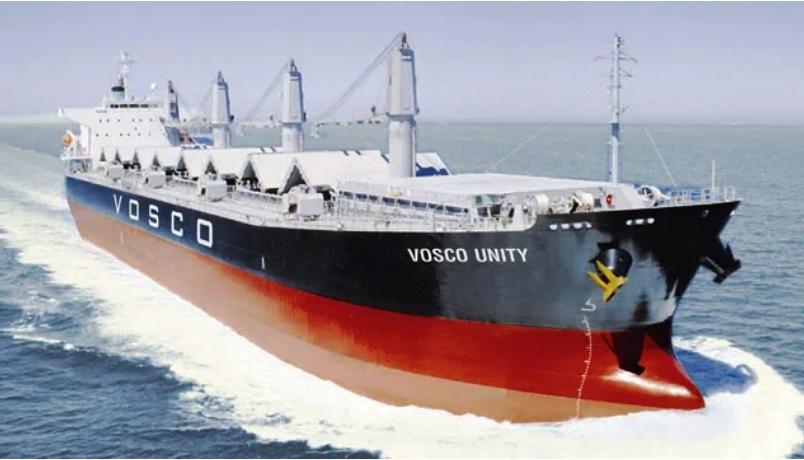Laytime Clauses 装卸时间条款
Working days of 24 consecutive hours, working days of 24 running hours, weather permitting
天气允许的连续 24 小时工作日
2.133 Although at first sight these may seem very similar to one of the laytime clauses considered in the previous section, as will be seen, the one word that is different makes a considerable change, although there is no difference between the two alternatives.
2.133 尽管乍看起来,它同上一节所讲的装卸时间条款之一非常相似,但是马上就会看出,一字之差会产生明显的变化,虽然两个条款之间并没有什么区别。
2.134 A working day of 24 consecutive or running hours is a conventional day of 24 hours which follow one after the other throughout the day and night and which is a working day as opposed to a Sunday or holiday. The full period of 24 hours therefore counts against laytime and not merely the hours usually or actually worked where the words ‘‘consecutive’’ or ‘‘running’’ are omitted.
2.134 连续24小时工作日是一个24小时的传统约定日,该日是不分昼夜地一天接着一天连续计算的,是一个不同于星期日或节假日的日。因此,整个24小时的期间均计入装卸时间,而不像当‘连续的’字样疏忽遗忘时,单单计入通常的或实际作业的时间。
2.135 The leading case where one of the clauses was considered was a Scottish case, Turnbull, Scott & Co v. Cruickshank & Co.
2.135典型的案例是Turnbuli, Scott & Co v. Cruickshank & Co苏格兰的案件,在该案讨论了其中一个条款。

2.136 The case arose out of the carriage of a cargo of iron ore from Spain to Ardrossan on the Clyde. Loading and discharging were to be ‘‘at the rate of 500 tons per working day of 24 consecutive hours, weather permitting, Sundays and holidays always excepted’’.
2.136 这是一个涉及船舶Clyde从西班牙往英国Androssan港运输铁矿石的案件,合同规定的装卸率为‘天气允许的情况下,每连续24小时工作日500吨,星期日和节假日除外’。
2.137 Relying on Forest Steamship Co Ltd v. Iberian Iron Ore Co Ltd, the charterers claimed they were entitled to a series of artificial periods consisting of 24 hours when work was usually performed and that they were required to load or discharge 500 tons during each such period of 24 hours. On the other hand, the shipowners contended that what they were allowed was a day of 24 actually consecutive hours for loading/ discharging each 500 tons so that apart from weather interruptions and Sundays/holidays, time would run and count continuously.
2.137依据Forest Steamship Co Ltd v. Iberian Iron Ore Co Ltd案例,承租人主张:他们有权享用作业能够正常进行的24个小时组成的一系列的人为构造日并且在每一个能够进行正常作业的这24个小时期间内装/卸500吨的货物。另一方面,船东却争辩:承租人每装/卸500吨货,实际上允许他们的是一个连续24小时工作日,这样除了天气造成的中断和星期日/节假日,装卸时间应持续不断地计算。
2.138 In the court below, the Sheriff-substitute commented that he could not read consecutive hours ‘‘as meaning anything else than hours following one another immediately and without interval of time’’. The Court of Session upheld the shipowner’s argument. Lord Trayner pointed out that in the Forest Steamship case, the laytime clause was held to mean 24 working hours rather than 24 consecutive hours, adding:
In the clause before us there is the exception that hours when the weather did not permit of loading or discharging were not to be reckoned against the charterers, nor were holidays nor Sundays. But in every twenty-four consecutive hours from the commencement of the loading or discharging, 500 tons were to be loaded or discharged if the weather did not hinder it or a holiday or Sunday intervene. And in my opinion the words ‘‘working day’’ in the clause before us are used only in antithesis to the days which were Sundays or holidays.
2.138在下级法院,行政司法官助理评述说,我不能把连续小时解读为‘其它别的意思,而应是一个马上紧接着一个毫无间隔的小时’。苏格兰最高民事法庭支持船东的论点。Trayner勋爵指出:在Forest Steamship案中,装卸时间条款被判决的意思是指24个小时工作时间,而不是连续24小时,他补充说:
摆在我们面前是该案条款中有一除外情况,当天气情况不允许进行装/卸货物的时间数,不计入承租人的时间,节假日和星期日也不计入。但是,从装/卸作业开始,如果未受天气情况的干扰或期间没有星期日和节假日介入的话,每连续24小时就应装/卸500吨的货物。而且,在我看来,条款中所用的‘工作日’一词是相对比于星期日或节假日而言的。

2.139 The effect of the ‘‘weather permitting’’ part of the clause will be similar to other laytime clauses where this phrase is used. Where weather does not permit cargo working or would not if any had been intended or the vessel in a position so to do, then the actual period so affected must be deducted. This applies even if the period concerned is in the middle of the night, whether or not working was possible at such an hour. This follows from the decision of the Court of Appeal in The Vorras, where the addition of ‘‘weather permitting’’ was said to make the whole clause descriptive, rather than exceptive.
2.139该条款中的‘天气允许的情况下’的作用与其他装卸时间条款中使用的这一短语的作用相似。如果船舶已经计划装卸或者处于可以装卸的位置,而天气情况确实不允许进行货物作业或者不能够进行作业,这样,实际受影响的期间就必须被扣除掉。甚至当这一期间发生在午夜时,此原则亦适用,而不论在此期间是否可能作业。这是根据上诉法院对The Vonras—案的判决而得出的结论,其中的附加用语“天气允许的情况下”使得整个条款成为描述性的,而不是除外性的。

《装卸时间与滞期费》购买链接(点击可购买)
海运圈聚焦专栏作者 魏长庚船长(微信号CaptWei)

 2018-05-09
2018-05-09 766
766 












